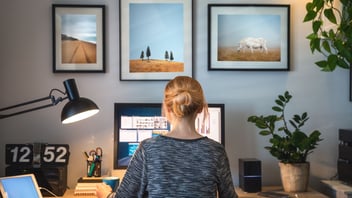
What I Wish I Knew – career advice from Angela Piasente

Marketing guru Angela Piasente talks about the importance of being uncomfortable, why curiosity is a must-have character trait, and a secret ingredient to success that she calls “jazz hands”.
Feeling comfortable in your current role? Be warned! According to Angela Piasente, Marketing Manager at Bel Group, being comfortable can lead to professional stagnation, irrelevance or even redundancy. But what can be done?
Find out in this next instalment of our “What I Wish I Knew” interview series, packed with advice on how to get the best out of a mentoring relationship, how to delegate successfully, and much more.
Who inspires you?
Firstly, Celeste Barber of Instagram fame. People assume she’s an overnight Insta-celeb, but she actually worked really hard to reach where she is today. Celeste is an actress and comedian, she’s written a lot of her own skits and plays, she just wants to make people laugh … and she’s real. She’s funny without putting anyone else down, and I think she’s a successful businesswoman because of that. She was in her 30s when she achieved her Insta-fame.
Another person I’m inspired by is Zoë Foster Blake. I started reading her books 10 or 15 years ago, before she even knew who Hamish Blake was – she was an author in her own right. What I love about Zoë is she sees an opportunity and finds a way to get it off the ground. Her brand (Go-To) came about because while she was an editor for Cosmopolitan she saw an opportunity for an organic range that was really clean and simple, but couldn’t find anyone to sell it … so she did it herself. She became extremely successful, but her celebrity status came afterwards.
Closer to home, I find my four brothers very inspirational. Two of them started in the corporate world before taking a risk and setting up their own businesses – but they didn’t do so until they were in their mid-thirties. They recognised that they needed to gain experience and develop important relationships before setting up on their own. My other brother – who is a builder – understands the importance of relationships as well. It takes time to establish relationships and score some runs on the board before you go and set up your own business.
You may have noticed that there’s a theme here! I’m inspired by people who realise that you don’t get things instantly. They take time to understand their strengths and then use those to work towards their goals, whatever they may be.
How important is mentorship to you?
Until recently, all of the mentors in my life weren’t particularly formal relationships. I would simply ask them for their time over a coffee to get their advice. I remember my very first mentor gave me guidance when I was working in a really stressful job and didn’t necessarily feel supported by the people around me. She taught me about the importance of relationships.
Another fantastic mentor was a colleague at Murray-Goulburn. She asked me questions that I’d never asked myself and gave me ideas on how to present myself in uncomfortable situations. At the time I was working on a small brand within a big business, so she helped me build up that brand’s profile by doing things a bit differently. I made full use of the relationship skills that I’d built … and also a little bit of what I call the “jazz hands”, where I’d take a few facts and create something theatrical to really stand out.
If you ask a mentor to take the time to meet with you, be prepared to respond to hard questions that you wouldn’t usually ask yourself. Mentors help you challenge the status quo. They make you uncomfortable – and I think that’s the most important thing. There’s a misconception that mentors are people who don’t have time, but mentors generally LOVE giving back. They love to be asked to share their experience. And they also say the most surprising thing is how much they learn from the mentee.
How do you ensure you stay as relevant as possible?
I’m going to touch on the concept of being uncomfortable again. If you really want to grow, you have to be curious, otherwise you will stay comfortable. And if you stay comfortable you’ll either remain in the position you’re in, you’ll be made redundant, or you’ll leave.
Without curiosity, you run the risk of becoming irrelevant. I stay curious (and relevant) by asking lots of questions and listening to people younger than me. I also go to as many open forums as possible because I learn through listening and watching. The other way I stay relevant is by encouraging a cycle of 360-degree feedback. A good rule of thumb is that if one person gives you a piece of feedback, you need to consider that an opinion. If it comes from multiple sources, then it’s feedback.
How important is goal-setting to you?
I used to set goals all the time; particularly in my twenties and thirties – I would tick boxes, achieve half of them and be forever disappointed that I didn’t achieve the other half.
What I found was these goals were restricting me – I was 100% focussed on achieving a goal and wasn’t looking outside of those goals at other opportunities. To give an example, I was presented with the opportunity to work overseas at the age of 30 – it didn’t fit within my set of goals, so I very nearly said: “I’m not going” … and would have missed one of the greatest opportunities of my life.
It’s good to know who you are and where you are going. Uncovering your values and your purpose is so much more important than thinking you have to tick boxes.
What do you wish you could tell your 21-year-old self?
There are so many things I’d like to say! I’m going to narrow it down to four:
Ask for help – you are not the expert in everything, but there are experts around you. Learn to delegate so you can focus on the things that you do well.
You’re not going to be amazing every day. You’re human!
Know that everyone is faking it. Stop self-deprecating and have some confidence. The person you’re comparing yourself to is comparing themselves back at you.
Stop dyeing your hair red, Ange – it doesn’t suit you. Get a new hairdresser.
If you could have a billboard with anything on it, what would it say?
Treat people how you would like to be treated – they might be your boss someday!
To stay up to date with the latest updates, get in touch or follow us on LinkedIn.
Related


Overcoming imposter syndrome in interviews
Why do candidate struggle to “sell themselves” during an interview? What is the point of an...

Understanding burnout – why it matters and what to do about it
Most of us understand the importance of taking time off work when we’re physically unwell or...

 Accessibility
Accessibility